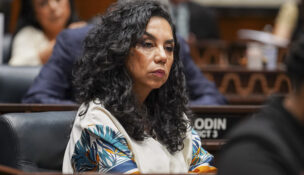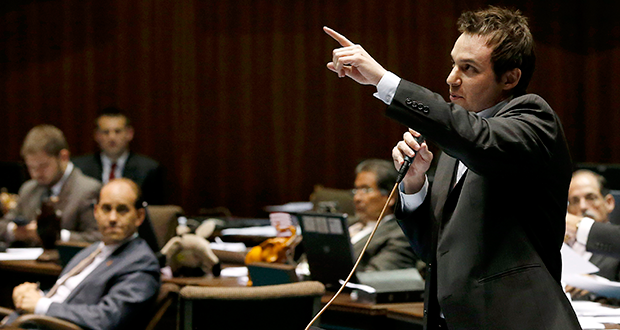DINO committee made its return in 2025, with much better results than 2023
Reagan Priest Arizona Capitol Times//July 18, 2025//
DINO committee made its return in 2025, with much better results than 2023
Reagan Priest Arizona Capitol Times//July 18, 2025//
Key Points:
-
The Senate Committee on Director Nominations resumed this session
-
Twelve nominees were ultimately confirmed, but six agencies are still without permanent leadership
-
Hobbs blames “partisan agenda,” Hoffman claims committee is working as intended
The Director Nominations Committee battle between Gov. Katie Hobbs and Sen. Jake Hoffman continued in earnest in 2025, but with arguably better results than the first round in 2023.
Hobbs is over halfway through her first term as governor and still does not have Senate-confirmed directors at all state agencies. But 12 of her nominees managed to make it out of Hoffman’s Director Nominations Committee, known as DINO, and through a full Senate vote during the 2025 session — a marked difference from the committee’s progress in 2023.
Hoffman maintains that the vetting process, created specifically by the Republican Senate to evaluate the Democratic governor’s nominees, is working as intended. But Hobbs and several former agency heads say it is creating chaos at otherwise apolitical agencies and scaring off potential candidates.
“There are six (nominees) still outstanding, and those are folks that Jake Hoffman continues to play political games with and hold up with his partisan agenda,” Hobbs told the Arizona Capitol Times. “…We’re going to continue to look at our options and put forward qualified nominees that should be able to go through a fair confirmation process.”
Hoffman and Senate President Warren Petersen, the creators of DINO, defended the committee’s work throughout the session as Hobbs and her office accused Hoffman of being obstructionist.
“While some enjoy focusing on those who were rejected and colorful bantering between the Executive and the Senate, the fact is we have confirmed the vast majority of the nominees and now have just a handful of unconfirmed nominees,” Petersen said in a May 6 press release. “The process is simple. If the Governor sends us qualified, non-partisan nominees, they will be confirmed by a bipartisan group of Senators.”
Hoffman told the Arizona Capitol Times that he is satisfied with the work DINO did this session and isn’t planning on letting up anytime soon.
“Our goal has always been to get qualified nominees into these roles,” Hoffman said. “And I think this year we showed that that was something that we could do.”
The confirmation process bled into the 2025 session after Hobbs pulled her nominees from consideration in 2023. At that point, Hoffman’s committee had only confirmed a few directors and had rejected or withheld others from consideration after intense and politicized hearings.
Although this year’s effort proved more successful, it was still contentious and unpredictable, and resulted in several agency heads losing their positions.
Two nominees were rejected by either Hoffman’s committee or the full Senate. Two others at the Department of Health Services and the Health Care Cost Containment System were withdrawn by Hobbs after “it became clear” that the Senate would reject them. And two more were left unconfirmed when the session adjourned in late June, despite both appearing for confirmation hearings.
Almost all of those nominees were branded “unqualified” by Hoffman and his fellow Republican committee members, though most had decades of experience in their respective fields or in the very agencies they hoped to lead.
And even those nominees who were confirmed were often grilled extensively by the committee or made to sweat before receiving full approval from the Senate. Paul Brierley, the director of the Department of Agriculture, was chastised for making a post in 2019 that was critical of President Donald Trump. His nomination passed out of the DINO committee in April, but wasn’t put up for a full Senate vote until June.
Elizabeth Thorson, the director of the Department of Administration, had her nomination tabled in 2023 after a lengthy hearing during which she was questioned about her personal views on abortion. She was confirmed quietly without a second hearing during a last minute vote on the day the Senate adjourned sine die, over two years after she was first appointed to the position.
Hoffman defended the confirmation hearing process, noting the committee was able to hold one hearing a week for a good portion of the session. He also said he believes it has forced Hobbs to find more moderate candidates to lead agencies.
“In (almost) every case … the second person we receive has been far more qualified, far more competent and far less partisan than the initial person that was nominated by the governor,” Hoffman said.
While he is pleased with the results, former state agency leaders say DINO has dragged good people through the mud and disrupted critical government functions.
Will Humble, the director of the Department of Health Services under former Govs. Jan Brewer and Doug Ducey, has long been a fan of the concept of DINO, but said its execution has left much to be desired.
Humble said he felt Hoffman completely ignored the statutes that detail the qualifications required for director positions. Most of those statutes are vague and outline minimal requirements for agency directors, though some require specific degrees or areas of experience.
“Instead of harassing candidates, (Hoffman) ought to be running bills to … go into each of those agency director descriptions and update the statutory requirements for the job,” Humble said.
Hoffman said he and members of DINO aren’t just looking at “paper qualifications” when vetting nominees, however.
“These are very important agencies, and there’s a difference between someone who can fill a function within that agency, and someone who is equipped to actually lead that agency and be really the place where the buck stops,” Hoffman said.
Two of Hobbs’ former nominees, Martin Quezada and David Lujan, said they were disappointed but not surprised to see how DINO handled nominations this session.
“I expected that this would continue to happen and it’s following the same pattern that it did before,” Quezada said.
Quezada, a former state senator, had his nomination to serve as director of the Registrar of Contractors rejected in 2023 due to his past comments on political issues. He said that the rejection and his subsequent resignation from the position were difficult for him both personally and professionally.
“That impacted not only me as an agency director, it impacted me as a lawyer, it impacted me as a community member, and it impacted me as a member of my family,” Quezada said. “And that same scenario is happening to each of these other directors that are having to resign. My heart goes out to all of them, because they don’t deserve this.”
Lujan, also a former state lawmaker, had his nomination as director of the Department of Child Services withdrawn after Senate Republicans refused to confirm him. He said the impact he felt was on the agency, its employees and the families they serve.
“That constant change is disruptive to the work of the agency, an agency that does some of the most important work in the state of keeping children safe and working to keep families together,” Lujan said. “That’s where the real harm is in the whole process.”
Both Lujan and Quezada said they personally know many of the nominees who were rejected, withdrawn, or held over this session and pushed back on claims that those individuals were unqualified for the jobs they were nominated for. Lujan also said he believes Hobbs will have a hard time finding replacements to lead those agencies now in need of new directors, given what all of her nominees have been put through.
“I think a lot of people who have seen how nominees are treated in that committee would think, ‘Why bother? Why should I put myself through that experience and jeopardize my career goals to go through that process?’”
Hoffman said he believes there are no shortage of candidates for Hobbs to choose from and even suggested two to the governor’s office whom he believes both she and the Senate could agree on.
“There are people who want to do these jobs, who are highly qualified, highly competent and willing to do a nonpartisan job in the role,” Hoffman said. “I don’t think Katie Hobbs wants them.”
Hoffman pledged to continue the DINO committee if a Republican is elected governor in 2026 and said he can’t imagine the Legislature will return to its previous confirmation process even after he is no longer serving in the Senate.
“We’ve shown that this process works…” Hoffman said. “So why change something that is effective and that is actually working?”














































